#six paths
Explore tagged Tumblr posts
Text
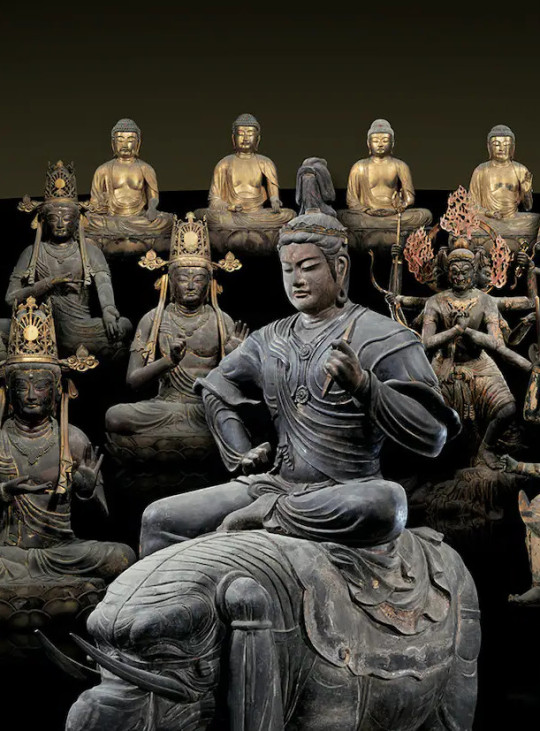
Buddha to his disciples, mini-series (20)
Samsara (Reincarnation)
“When something disappears, something is born. In Buddhism, life and death are the same thing.”
“Samsara” is a Pali & Sanskrit word that literally means "wandering through, flowing on", wherein the term connotes "cyclic change" or, less formally, "running around in circles." It is therefore also translated as 'reincarnation'.
Ancient Indians believed in reincarnation, or rather took it for granted. Therefore, the Buddha also thought it was natural and taught on the premise of reincarnation. And the purpose of the Buddha's teaching is for us to escape from this world of samsara (namely, liberation/enlightenment: Ref).
There are six realms of samsara as conceived by the ancient Indians. They are listed in order of increasing suffering as follows:
World of Hell (naraka), the world of the most suffering. Hell means 'underground prison'.
World of hungry ghosts (preta), a world suffering from hunger pangs. Becomes a demon with a swollen belly. A world where those who have committed the sin of greed are reborn.
World of animals (tiryagyoni), including birds, beasts, fish and insects. There are about 3.4 billion species.
World of warlike demigods (asura), Asura is a demonic species. A world where asuras live and fight all the time, causing constant suffering and anger.
World of human beings (manushya), in which human beings live. It is plagued by the fundamental sufferings, the four and eight afflictions, which are unavoidable in human life.
World of gods or celestial beings (deva), Heavenly beings can fly, and the world is full of pleasures, but here too there is the suffering of old age and death.

ブッダから弟子たちへ、ミニシリーズ (20)
輪廻 〜 “何かが無くなれば、何かが生まれる。仏教では生と死は同じものである。”
“輪廻”はサンスクリット語で「サンサーラ」という。この語の本来の意味は「さまよう、流れる」を意味し、生あるものが無限の生死を繰り返すことを指��言葉だ。よって、”輪廻転生”とも訳される。
古代のインド人は、誰もが輪廻転生を信じていた、というよりは、それがあたりまえだと思っていたのだ。よって、釈迦もそれが当たり前だと思い、輪廻を前提にして教えを説いている。そして、釈迦の教えは、われわれがこの輪廻転生の世界から脱出すること(すなわち解脱:参照)が目的である。
古代インド人が考えた輪廻の世界は六つだ。以下、苦しみの多い順に並べる:
地獄界〜最も苦しみの多い世界。地獄とは「地下の牢獄」の意。
餓鬼界〜飢えの苦しみに悩む世界。腹が膨れた姿の鬼になる。慳貪の罪を犯した人が再生する世界。
畜生界〜畜生界は鳥・獣・魚・虫など畜生の世界。種類は約34億種。
修羅界〜修羅は阿修羅といい、魔類。阿修羅が住み、終始戦い争うために苦しみと怒りが絶えない世界。
人間界〜人間が住む世界。人間が生きている上で避けては通れない、根源的な苦、四苦八苦に悩まされる。
天上界〜天人は空を飛ぶことができ、快楽の多い世界だが、ここにも老・死の苦しみがある。
148 notes
·
View notes
Text

Chapter 666
173 notes
·
View notes
Text
The history in fiction: Parallels between historical Japan and the Narutoverse
Part 1: The era of the Six Paths
Naruto may not be a historical fiction and most people will think that the utmost historical reference in the series is the fact that ninja were a thing in feudal Japan. But what if I told you that there is an insane amount of historical parallels in the series? That we could actually place the events of the main timeline within real periods of Japanese history? In this two-part series, I’ll be explaining the many parallels, references and design inspirations of the main events and generations that shaped the course of the series that we all know and love. I’ll start with the era of the Six Paths (starting from Kaguya and ending with Indra and Ashura), and part 2 will be about the Warring States (dynamic between the Senju and Uchiha). At the end of each part, I’ll add useful links so that you can deepen your investigation and see my sources. Without further ado, let’s start overanalyzing.
Historical references and parallels in character design and dynamics
I’d place this particular era of the Narutoverse in the Heian period of Japan (or at least the most important people, the brothers Indra and Ashura). Considering that we’re spanning 3 generations here, I’ll separate the individuals involved in the following way:
Kaguya: End of Nara period (710 AD - 784 AD)
Hagoromo and Hamura: Early Heian period (794 AD - 1185 AD)
Indra and Ashura: Heian period (794 AD - 1185 AD)
Kaguya
On a side note, I’d like to add that I’m not really considering Tenji in the list above because he’s an anime only character. However, his case caught my eye so I’ll discuss him as well. Let’s start by evaluating Kaguya and Tenji then. Kaguya’s character design is a very classical archetype of Heian beauty standards and clothing. Long, straight hair with flowy kimono and a delicate face. Her unusual eyebrows are no coincidence as well, as in the Heian period the practice of hikimayu was commonplace in noblewomen.
"Hiki means "pull" and mayu means "eyebrows". Aristocratic women used to pluck or shave their eyebrows and paint new ones using a powdered ink called haizumi, which was made of soot from sesame or rapeseed oils." (source)

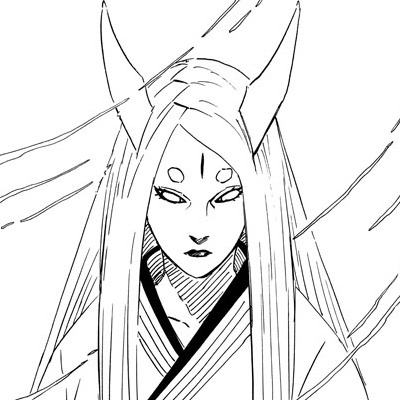
Left: Filler anime episode // Right: Manga panel

Above: Hikimayu through the ages of Japan
Another interesting fact that I’d like to point out is that Kaguya is a character with striking similarity to a Japanese folk tale, in this case the Tale of Princess Kaguya (Kaguyahime no monogatari), whose origin we can trace back to Heian Japan. The Tale of Princess Kaguya tells the story of a little baby girl who “fell from the skies” and was found by a couple of old farmers inside of a bamboo. She grew up to be extremely beautiful and was courted by lots of noblemen, but she rejected them all insisting that somebody would come for her, as she looked at the moon. Of course, Naruto provides us with a different ending to the story but this similarity can’t be overlooked.
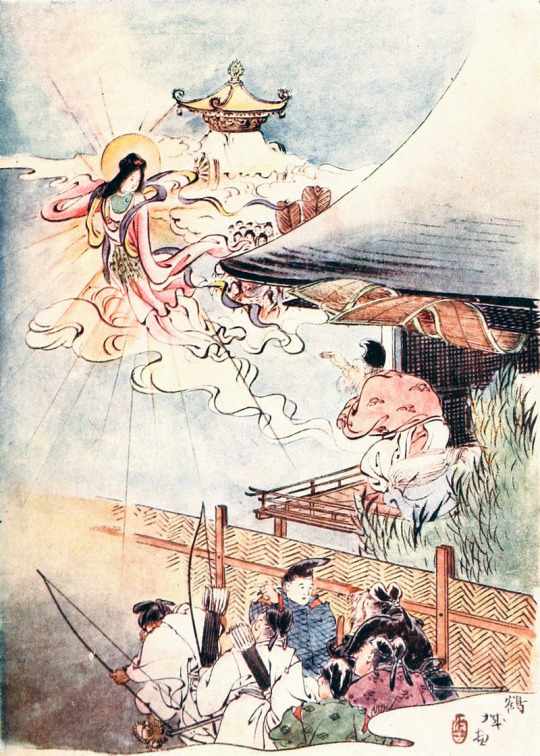
Above: "The Receding Princess" from The Japanese Fairy Book, 1908
Moving on to Tenji, it gets a bit more complicated to place him in an exact historical moment as he has elements of many different periods. His hairstyle resembles the styling of the Jomon period, whereas the entire setting in the filler episodes are more similar to the Nara period with the many small kingdoms fighting for dominance within a vast land, just like pre-unification Japan. Therefore, I place Kaguya and Tenji at the end of the Nara period, because we see how Kaguya takes over Tenji’s rulership and is regarded as a noblewoman after she casts the first Infinite Tsukuyomi. I have to rely on some filler in this case because otherwise I can’t find a logical explanation as to why Hagoromo was so well settled and had a large group of people following his teachings if it wasn’t for Kaguya ruling some land that originally belonged to Tenji.
Hagoromo and Hamura
Let’s start with the second generation. Following the events of the end of the Nara period I quoted in the previous section, Hagoromo and Hamura would go in the beginning of the Heian period. Their character designs feature long, flowy tunics without a visible belt. Here you have an image of men’s clothes through Japanese history, the third one being a feudal lord of the Heian period. Compare and contrast with these anime and manga images.
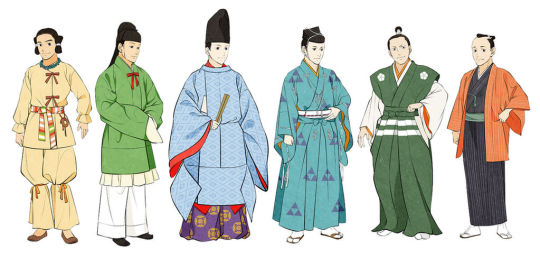
Above: “Men’s Japanese clothes” by Glimja
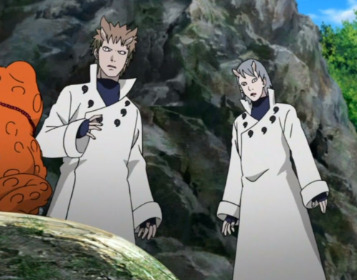

Left: Filler anime episode with both // Right: Hagoromo manga panel
Again, since we get very few manga panels related to Hagoromo and his sons, I’ll refer once again to the filler episodes where he is shown as the ruler of a village. The spot within the Heian period in which I’m placing Hagoromo would be around 100 years after the Taika reforms which established one of the first codes of law in Japan and (Taihō code) and divided the country in provinces ruled by feudal lords. Curiously, around the time where the Taika reforms happened, there was an emperor called Tenji.
Indra and Ashura
The third generation of the alien-human hybrids is here, and I place them in the Heian period as well. My main reason to consider Indra and Ashura in the Heian period is the fact that this is the exact time period where the samurai originate. A common misconception is that a samurai is a Japanese warrior highly trained in the martial arts and weapons. While this statement holds some truth, the samurai were the military social class of feudal Japan, which means that there were people who were of the samurai class but had never touched a weapon in their lives. Therefore, samurai clans were not entirely composed by warriors but also had a number of people who lived a more “civilian” lifestyle. And you may be wondering, “what do the historical samurai have to do with the ninja that we see in Naruto?”. The answer is: more than you think. Historically speaking, the ninja is a samurai specialised in stealth and sneaking, the only difference with the Naruto universe is that the ninja we know and love from the show possess chakra and perform techniques with that.
The story of Indra and Ashura is strongly tied to the origin of ninja clans in Naruto, just as the Heian period is the origin of the samurai clans. From this time period I’d like to highlight the myth of Minamoto no Yorimitsu, more commonly known as Minamoto no Raiko. His story says that he slayed demons (yes, really) and saved many maidens from being abused by drunk oni with his great sword, Dojigiri Yasutsuna. The difference between myth and legend is that myths hold some kind of historical fact whereas legends are purely fictional. Minamoto no Raiko has been heavily mythified and his story sounds unbelievable or too much like a fantasy story until you realise that he did exist and that his sword is kept in a museum. Doesn’t this resemble how the origins of ninja in Naruto are almost like fantasy stories up until Hagoromo shows up in the 4th war and explains that everything was real all along?

Above: Ukiyo-e of Minamoto no Raiko and others fighting the demon Shuten Doji.
Just as Minamoto no Raiko is considered the first samurai, Indra could be considered the first shinobi. He was the first to channel and shape chakra to create jutsu, and he was considered as part of the legends surrounding Hagoromo. Please compare these two panel sequences, one is from earlier in the story and the second one is Hagoromo’s version.
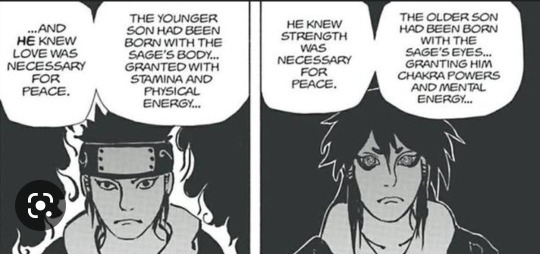

The brothers’ character design can also be correlated with the Heian period. Indra’s eyebrows seem to be real but resemble the hikimayu design of Kaguya’s eyebrows, however he does add eye makeup. The people who wore makeup in the Heian period were nobles (mostly noblewomen), once again reinforcing my point that this family started out as feudal lords and eventually fused with the warrior class, becoming ninja clans. Although the character design for Indra and Ashura isn’t 100% equal to Heian Japan’s male clothing, the inspiration is subtle yet visible. I’d say that the inspiration is mostly for the plot rather than the appearance of the character. If you’d like to see more real Heian period clothing, this link has recreations of the outfits of the characters in the Tale of Genji, by Murasaki Shikibu.
Sources
These are some useful links that I’ve referred to while writing this post. I’d like to invite you to read them if you’d like to do further research on the beautiful history of Japan.
https://www.britannica.com/biography/Tenji
https://www.britannica.com/event/Taika-era-reforms
https://www.japanhousela.com/articles/princess-kaguya-a-tale-for-the-ages
https://en.wikipedia.org/wiki/Hikimayu#:~:text=Hiki means "pull" and mayu,from sesame or rapeseed oils.
https://www.thoughtco.com/beauty-in-heian-japan-195557
https://history.hanover.edu/hhr/22/HHR2022miller.pdf
https://www.tumblr.com/heian-collection/30869762024/beauty-ideal-in-heian-japan?source=share
https://thegate12.com/article/264
Thanks for reading! Stay tuned for part 2, the Warring States era. Special thanks to @al-hekima-madara-blog for actually motivating me to write all of this down 💜
#purple rambles#purple's historical analysis#naruto#naruto shippuden#six paths#kaguya otsutsuki#hagoromo otsutsuki#hamura otsutsuki#indra otsutsuki#otsutsuki indra#ashura otsutsuki#oh goodness this was a very long post#but it was really fun to make!
104 notes
·
View notes
Photo

#gif#naruto#ナルト#naruto shippuden#ナルト- 疾風伝#madara#anime#tv#guy#anime gif#madara uchiha#gifs#might guy#six paths#eight gates#opening#credits#intro
86 notes
·
View notes
Text








#naruto#Asuka Senran Kagura#Hinata Hyuga#Ninja Voltage#Six Paths#Sasuke Uchiha#Madara Uchiha#Hashirama Senju
3 notes
·
View notes
Text
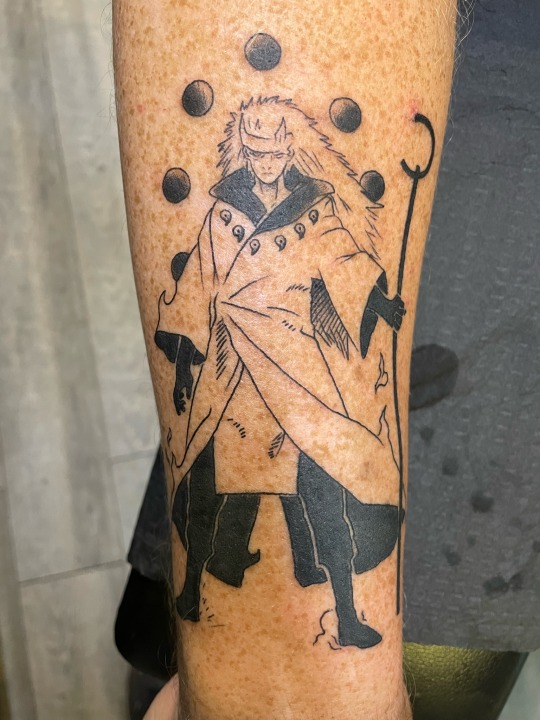
For those who asked .. UCHIHA MADARA 6 PATHS TATTOO 🔥
#anime#madara uchiha#Uchiha#Madara#tattoo#legend#legendary#Naruto#six paths#juubi#ten tails#jinchuriki
27 notes
·
View notes
Text


Funko Pop Animation Naruto Shippuden Madara Uchiha (Six Paths) - 1196
Link para compra BR: https://amzn.to/3xuGtRK
Buy here: https://amzn.to/4arMddE
#Funko Pop#Action Figure#outros#animation#anime#naruto shippuden#naruto#shonen jump#uchiha madara#madara uchiha#madara#six paths#otsutsuki
5 notes
·
View notes
Audio
Gorgonn’s Six Paths
#gorgonn#six paths#SVBKVLT#music#electronic#dubstep#techno#footwork#bass music#club#dance#trap#dub#dark ambient#bandcamp#yall this goes ridiculously hard
21 notes
·
View notes
Text

Konan and five out of the sixpaths of pein.
Posted two sceneshots in two different angles so all their faces are visable.
#the sims#the sims 4#the sims 4 naruto#ts#ts4#ts4 naruto#konan#six paths#six paths of pain#naruto#naruto shippuden#the sims screenshots#the sims 4 screenshots#ts screenshots#ts4 screenshots#ts anime#ts4 anime
5 notes
·
View notes
Text






"Just for today, you can be the spoiled one" CocoGaro comic
#path to nowhere#path to nowhere fanart#ptn#ptn garofano#ptn coquelic#cocogaro#yuri#old women yuri 😭😭😭😭😭😭😭#this was NOT meant to be six pages omg#theyre all different dimensions too . . i am so sorry .
248 notes
·
View notes
Text
Inspiring: Even the lamest sorority girl can shatter the wheel of reincarnation by subsuming her selfhood to the pursuit of pure violence!
#kill six billion demons#ksbd#inspiring#motivation#allison girl do u really think ‘mine is the path of mutilation’ is gonna be the outlook that lets u win#like good job resisting the worm queen but maybe enjoying something once in a while could be okay
264 notes
·
View notes
Text
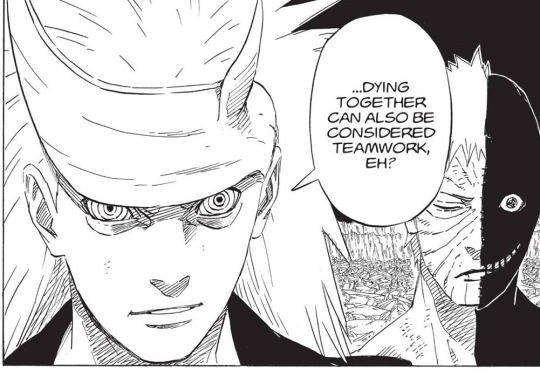
Chapter 676
122 notes
·
View notes
Text

awughhh silly shipchart.. my canonverse hcs 🧠
og post
#i say canonverse bc i usually age them up to their 20s so they can have less fun in life LMFAO#no more palling around after school yall gotta CLOCK IN and CHECK OUT!!!!!!#HOWEVER i definitely do enjoy writing/drawing them in the canon high school setting BECAUSE of the limitations !! :)#like man we got english lit at 8 am and The Unimaginable Horrors at 9:30 ughhhhh#wanna make out in the field after getting smashed on the six pack we stole from ur mom? (wakes up 5 miles away covered in hay)#anyways ive been getting back into my interests. um dont look at the calendar. (thank you psychiatric medications<3 )#so i made this as a fun lil refresher and a peek into my twisted cycle path mind 4 u all muah#jjba#jojo#josuke higashikata#okuyasu nijimura#josuyasu#my art
390 notes
·
View notes
Photo


#anime#naruto#ナルト#naruto shippuden#ナルト- 疾風伝#intro#sasuke#opening credits#naruto uzumaki#sauke uchiha#six paths#rinnegan#animecap#screencap
23 notes
·
View notes
Text










4 notes
·
View notes
Text










In the first episode of Season Six, “Startouched”, a white-haired girl in her late teens has emerged from a body of water onto a beach lit by the sun, and seen her not-actually-dead father who she lost two years ago restored to complete life with a dark magic spell that demands blood be spilled. She’s distraught after the intense trauma of killing another member of her family. Her father made peace with passing on, but she selfishly couldn’t bear losing him and acted to keep his spirit tethered to the mortal world, hurting him in the process. She stands, then falls. Someone she loves dearly, the male former high mage of Katolis with brown hair who has repeatedly used dark magic but solemnly sworn off it, embraces her and she returns it. But then he abandons her. She is unbalanced, despairing, directionless and lost.
In the last episode of Season Six, “Stardust”, a white-haired girl in her late teens has emerged from a body of water onto a beach lit by the moon, and is about to see her not-actually-dead father who she lost two years ago restored to complete life with a primal magic spell that demands blood be spilled. She’s relieved after the intense catharsis of enabling other members of her family to die. They made peace with passing on, and she selflessly accepted losing both of them and acted to heal and free their tethered spirits. She falls, then stands. Someone she loves dearly, the male high mage of Katolis with brown hair who has repeatedly used dark magic but solemnly sworn off it, embraces her and she returns it. He will never abandon her. She is mature, hopeful, purposeful and found.
#claudia saying ‘you owe me your life’ as if souls are money#and rayla having her parents’ souls trapped in literal money and liberating them all because that isn’t right#someone make that ‘dark path/light path’ meme#with them and the caption at the start ‘diving into water to save your dad while your boyfriend watches’#like. they do so many similar things but one has the worst day ever and the other an amazing day (at least before noticing the smoke)#tdp claudia#tdp rayla#tdp viren#tdp callum#the dragon prince#tdp#tdp spoilers#tdp season 6#tdp season six#tdp s6#rayllum
287 notes
·
View notes